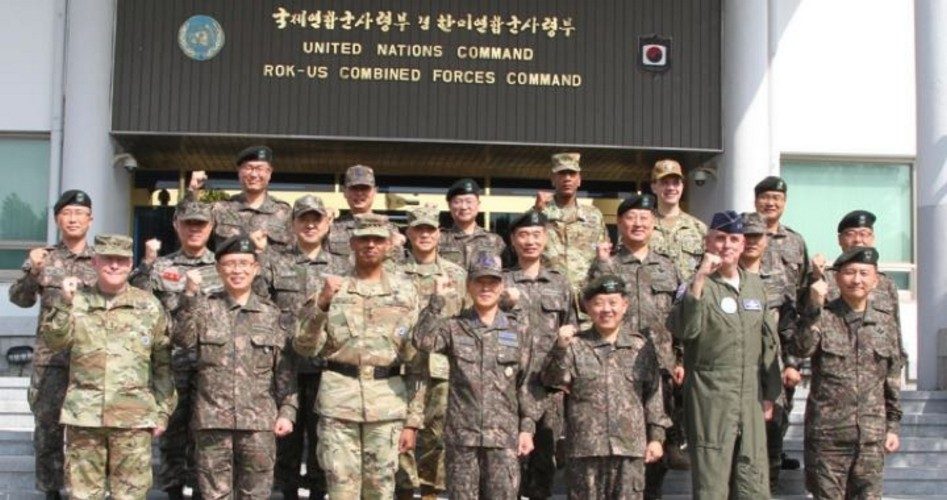
The joint military exercise conducted by the United States and South Korea, which were postponed during the Pyeongchang Winter Olympics, are planned to continue once the games are completed on February 25. The United States and South Korea usually hold three major military exercises each year, but South Korea Defense Minister Song Young-moo was quoted by the news media as stating: “We have agreed to uphold the basis until after the Paralympics … and not to confirm nor deny anything regarding what we would do after that until we announce it.”
The U.S. and South Korean militaries typically hold two operations in March and April called Key Resolve and Foal Eagle, noted Reuters. Presumably, the purpose of such exercises is to train for a joint U.S.-South Korean military operation against North Korea, which would be the height of interventionist folly, much like the Korean War of 1950-1953.
North Korean officials invited their counterparts from the South to discussions in Pyeongchang, South Korea, where both nations were assembled for the Olympics, for their first official talks in more than 10 years. Pyongyang and Seoul do not have diplomatic relations and are technically still at war (as is the United States), because the July 27, 1953, armistice that ended fighting did not formally end the Korean War.
Athletes from both countries marched together at the opening ceremony of the Olympic games, but that move was largely for show and did nothing to eliminate the heightened tensions on the Korean Peninsula resulting from the North’s testing of nuclear weapons and long-range missiles.
A report in Business Insider noted that North Korea has said the joint military drills “can never be compatible” with talks between the North and South, but the United States has made it clear that it wants denuclearization of the Korean peninsula at all costs, and will achieve that goal diplomatically or militarily.
BI observed that North Korea has a history of responding with provocations and likely will not sit by in silence as the military drills are conducted.
A recent statement released by the Korean Central News Agency charged: “The [President Donald] Trump group’s racket for resuming the war exercises is a wild act of ruthlessly trampling even a small sprout of peace that has been now seen on the Korean peninsula, and it is a provocative act of chilling the active efforts of [North Korea] and enthusiasm of the international community to defuse tension and create a peaceful environment.”
Secretary of State Rex Tillerson spoke in an interview with Margaret Brennan, White House and senior foreign affairs correspondent for CBS News, on 60 Minutes on February 18, during which U.S. relations with North Korea was the primary topic.
Brennan observed that in his New Year’s Day speech, North Korea’s leader Kim Jong-un said the entire area of the U.S. mainland is within Pyongyang’s nuclear strike range and said that has got to make Tillerson nervous.
Tillerson replied:
It does make us nervous…. It also stiffens our resolve. That kind of a threat to the American people by a regime like this is not acceptable. And the president’s meeting his responsibilities as commander in chief of asking our military, Secretary Mattis at the Defense Department, to ensure we are prepared for anything.
We’re not using a carrot to convince them to talk. We’re using large sticks.
After Brennan asked Tillerson if he is willing to work with and potentially negotiate with Kim, the secretary said that Kim is “who we will have to work with to achieve this diplomatically.” But he said what we have to determine, if we are ready to start, is whether the North Koreans are ready to start. And if the North Koreans are not ready, “we’ll just keep the pressure campaign underway and we will increase that pressure. And we are doing that every month. There are new sanctions rolled out. The world wants North Korea to change.”
North Korea is a totalitarian communist regime that is developing nuclear weapons and missiles that may someday be capable of carrying those weapons. They do represent a potential threat to U.S. safety. It is, therefore, well within the constitutional mandate of our government to do whatever is required to defend our nation and to (in the language of the Constitution) “protect [each state] against invasion.” This might indeed include imposing unilateral sanctions (our own sanctions, not the UN’s) against Pyongyang.
It also means that our military must maintain sufficient strength to pose a formidable deterrent against a North Korean attack, as well as an anti-ballistic missile system capable of intercepting enemy missiles before they reach us.
However, none of these measures requires us to engage in joint military exercises with South Korea. Such operations suggest that we are jointly responsible for South Korea’s defense in the event that the North attacks it. Remember that the United States suffered 33,686 battle deaths during the Korean War. Two decades after that, when we sent U.S. troops to assist the South Vietnamese against another totalitarian communist regime in North Vietnam, first as “advisors,” then as participants in the war, we lost 58,220 more troops in battle.
Unless we plan to commit more U.S. troops to another war in the Korean peninsula, our planned military exercises with South Korea are pointless, as is the presence of 28,500 U.S. troops stationed in that country.
Photo: defense.gov
Related articles:
North Korea Attacks U.S.-South Korean Military Exercises and Makes Wild Threats
North Korea Threatens “Merciless” Strikes Against U.S.-South Korean Forces
U.S. 7th Fleet Conducting Joint Exercises With Japan, South Korea
U.S.-South Korea Military Exercise Riles North
China Says It Will Remain Neutral if U.S. Retaliates Against North Korean First Strike



